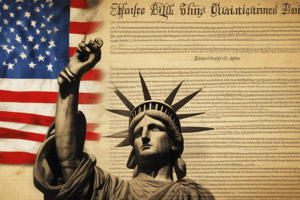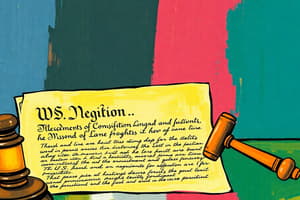Podcast
Questions and Answers
What is exempt from taxes and duties in non-stock, non-profit educational institutions?
What is exempt from taxes and duties in non-stock, non-profit educational institutions?
- Only revenues used for educational purposes
- All revenues and assets used for educational purposes (correct)
- Only assets used for non-educational purposes
- Neither revenues nor assets are exempt from taxes and duties
Under what conditions can proprietary education institutions be entitled to tax exemptions?
Under what conditions can proprietary education institutions be entitled to tax exemptions?
- Subject to the limitations provided by law (correct)
- Subject to the approval of the President
- Subject to the approval of Congress
- Subject to no limitations
What is exempt from tax, subject to conditions prescribed by law?
What is exempt from tax, subject to conditions prescribed by law?
- Grants and endowments
- Donations and contributions
- Grants, endowments, donations, or contributions used for education purposes (correct)
- None of the above
What is the highest budgetary priority of the State?
What is the highest budgetary priority of the State?
What is the limitation on the power to tax?
What is the limitation on the power to tax?
What is exempt from taxation?
What is exempt from taxation?
Where do appropriations, revenue or tariff bills originate?
Where do appropriations, revenue or tariff bills originate?
What cannot be included in the General Appropriations Bill?
What cannot be included in the General Appropriations Bill?
What is a fundamental right guaranteed by the Constitution?
What is a fundamental right guaranteed by the Constitution?
What is the main purpose of the rule of taxation?
What is the main purpose of the rule of taxation?
What is the consequence of misrepresentation of taxes?
What is the consequence of misrepresentation of taxes?
What is exempt from taxation?
What is exempt from taxation?
What is the power granted to the President regarding taxation?
What is the power granted to the President regarding taxation?
What is prohibited by the Constitution?
What is prohibited by the Constitution?
What is the consequence of non-payment of taxes?
What is the consequence of non-payment of taxes?
What is required for the passage of a law granting tax exemption?
What is required for the passage of a law granting tax exemption?
Flashcards are hidden until you start studying
Study Notes
Due Process and Equal Protection
- No person shall be deprived of life, liberty, or property without due process of law, nor shall any person be denied the equal protection of the laws.
- Due process applies to taxation and its processes.
Establishment of Religion
- No law shall be made respecting an establishment of religion, or prohibiting the free exercise thereof.
- The free exercise and enjoyment of religious profession and worship, without discrimination or preference, shall forever be allowed.
- No religious test shall be required for the exercise of civil or political rights.
- Public property cannot be appropriated for religious purposes.
Contracts and Imprisonment
- No law impairing the obligation of contracts shall be passed.
- No person shall be imprisoned for debt or non-payment of a poll tax.
Post-Facto Law and Bill of Attainder
- No post-facto law or bill of attainder shall be enacted.
Taxation
- The rule of taxation shall be uniform and equitable.
- The Congress shall evolve a progressive system of taxation.
- The Congress may, by law, authorize the President to fix within specified limits, tariff rates, import and export quotas, tonnage and wharfage dues, and other duties or imposts within the framework of the national development program of the Government.
- Charitable institutions, churches, mosques, non-profit cemeteries, and all lands, buildings, and improvements, actually, directly, and exclusively used for religious, charitable or educational purposes shall be exempt from taxation.
- No law granting any tax exemption shall be passed without the concurrence of a majority of all the Members of the Congress.
Education and Tax Exemptions
- All revenues and assets of non-stock, non-profit educational institutions used actually, directly, and exclusively for educational purposes shall be exempt from taxes and duties.
- Proprietary education institutions, including those cooperatively owned, may likewise be entitled to such exemptions subject to the limitations provided by law including restrictions on dividends and provisions for reinvestment.
- Grants, endowments, donations, or contributions used actually, directly, and exclusively for education purposes shall be exempt from tax.
Budget and Appropriations
- All appropriations, revenue or tariff bills, increase of the public debt, bills of local application and private bills shall originate in the House of Representatives, but the Senate may propose or concur with amendments.
- Congress may not increase the appropriations recommended by the President for the operation of the government as specified in the budget.
Studying That Suits You
Use AI to generate personalized quizzes and flashcards to suit your learning preferences.



